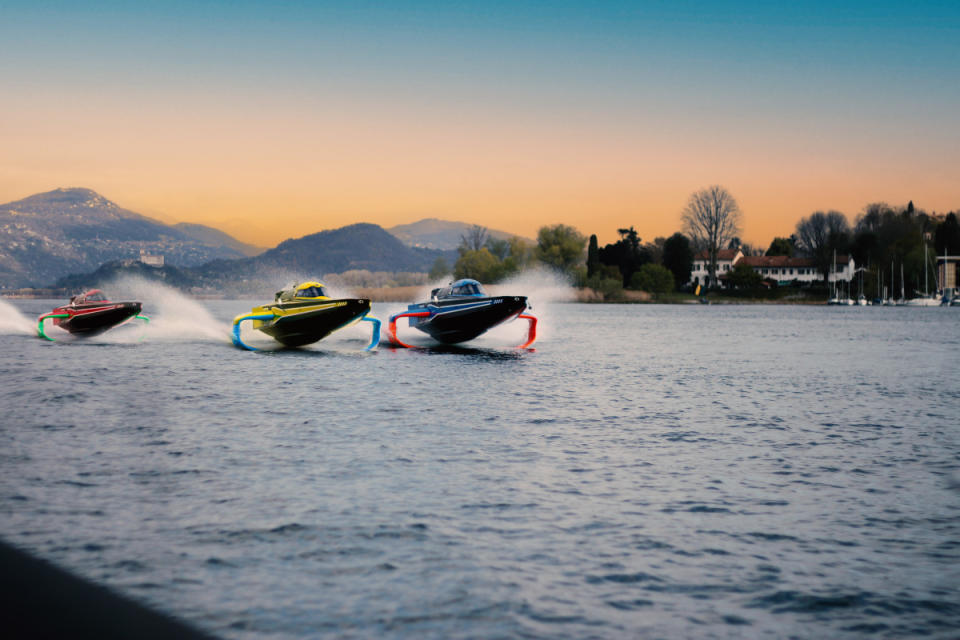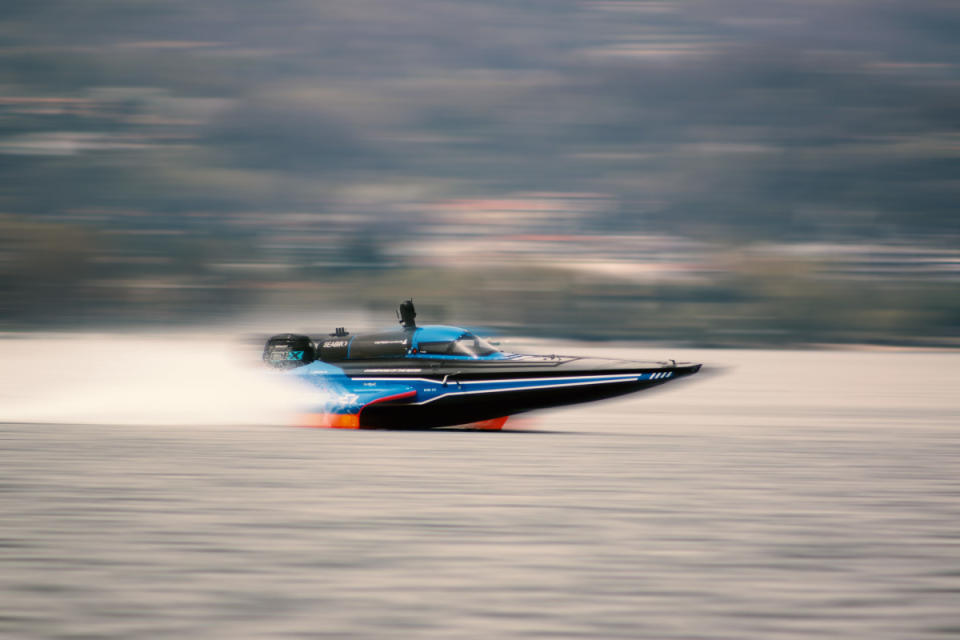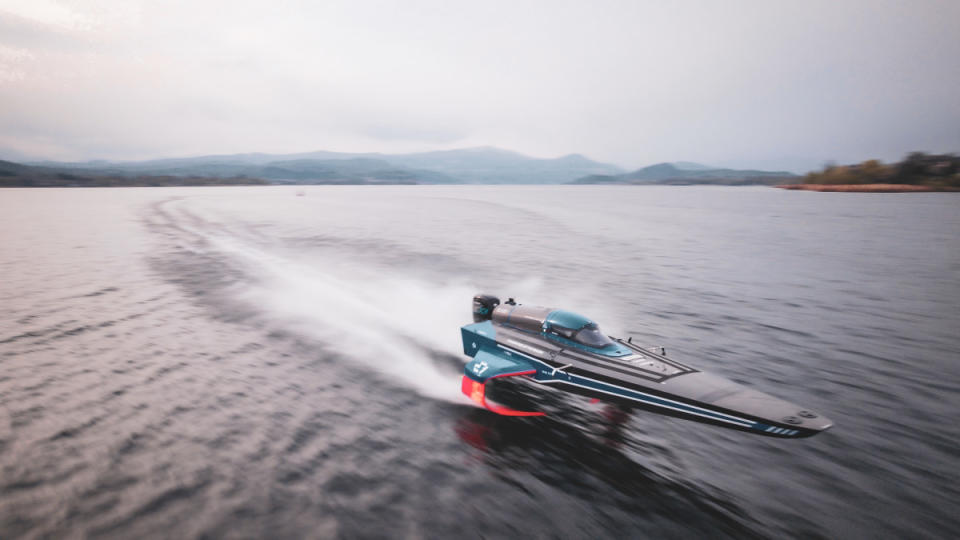Steve Aoki Joins Tom Brady, Rafael Nadal, and More Elite Team Owners in E1 World Powerboat Championship Series
- Oops!Something went wrong.Please try again later.
- Oops!Something went wrong.Please try again later.
- Oops!Something went wrong.Please try again later.
- Oops!Something went wrong.Please try again later.
- Oops!Something went wrong.Please try again later.
Steve Aoki knows a thing about beats per minute. For nearly three decades, he’s been cranking out playlists designed to keep the dance floor shaking. Now the EDM star has found a new side project that's raising pulses—but not how you'd think. The two-time Grammy-nominated DJ and record producer recently announced his decision to lead a team in the newly formed E1 World Championship racing series, the world’s first all-electric raceboat competition.
What Is E1?
Here's the quick and dirty: Twelve teams will pilot RaceBirds, raceboats powered by an electric outboard motor that are fitted with hydrofoils to lift clear out of the water to avoid excess drag, similar to catamarans. These boats will reach a top speed of about 50 knots.
Aoki joins an impressive squad of E1 team owners that includes former-quarterback Tom Brady, tennis star Rafael Nadal, F1 driver Sergio Perez, and former Chelsea striker Didier Drogba.
But it wasn’t that celeb-driven competition that drew Aoki in. The DJ’s father, Rocky Aoki, founder of the Benihana restaurant chain, was a passionate powerboat racer in the 1970s who competed alongside professionals…and won.
We caught up with Aoki not long after the announcement to chat about why he’s taking a crack at spinning steel powerboat propellers instead of sticking to vinyl-loaded decks.

Courtesy Image
Men's Journal: What made you want to get involved with E1 powerboat racing?
Steve Aoki: It's a family legacy. My father was an offshore boat racer before I was born. It’s interesting because when he was doing it in the 70s, it was actually very cool. There were a lot of people who followed it, similar to F1. So, when they reached out, it just felt like synergy.
It’s exciting to see something like this sport that really didn't have any inertia for decades bring you back in a new way. When you watch a boat go that fast, that's electric. That's technologically innovative. That's doing something that also has an eco standard to it. I think it's going to really translate over.
So part of your interest was based on electrification?
Big time! I'm a futurist at heart and I own a few cars, but my favorite is my Tesla because it's electric. I like being smart about how we use energy, then you realize it's not just an eco answer. You go faster. The torque is insane in anything electric. People don't realize that. If you want power and speed, you go electric.

Courtesy Image
You see this technology evolving through power and speed? The boats are going to go harder, better, faster, stronger?
I think so. I don't know the actual specs and the comparisons on speed performance. I can only imagine it's a lot faster. You're foiling on top—gliding, almost hovering. I love that when you watch it, you can't take your eyes off it.
It's like when I play a new song for people. I don't want them to know it's my new song. It's the same kind of thing. I'm watching their face so I can get a true reaction—a real gut reaction. I think it's going to disrupt sports that deal with machines and speed.
Related: Young Guns and a Supercharged Catamaran: U.S. SailGP Team Takes on New York City
What's been the reaction from people so far?
Jaws dropping. People are going, ‘Oh my God, this is crazy! It looks insane!’ Let's put it this way, the way the kids say it these days, it's not "mid." That's why I'm excited about it. Now there's something else I can bite my teeth into and follow. The same way F1 just blew people's minds in the last five years.
What's going to be your role on the team?
I think I'm going to wear a lot of hats there, but at the end of the day, I'm making the executive decisions. I'm going to rely on a lot of experts, the right coaches, and the right leadership. It's my team and I want to learn about the sport and do my dad justice.

Courtesy Image
Are we going to see you behind the wheel of the boat at some point?
I definitely count myself as an adrenaline junkie. There's no doubt about it. I do all kinds of things a lot of my colleagues and contemporaries won't, but I'm nowhere near as crazy as my father. I don't understand how he got in those cigarette boats with very little knowledge on what it is to race. I'm sure he had some knowledge, but nothing compared to a professional and he raced at the highest levels of offshore boat racing. I just don't understand how someone can actually just say, ‘Fuck it, I'm going to do it.’
I can't do that. I have a level of calculated risk I’m comfortable with so my life can function at an optimal level, because I do tour quite a lot and I make a ton of music, and I want to make sure I'm always doing what I love to do. So, yes, you'll see me in the captain's chair of the boat, but recreationally, not in a race.
Related: Formula One Is Shifting Into High Gear in America
What impact are you hoping to make?
The big ghost in the room is my father. He's there. He's there holding some lever somehow. I want to do whatever I can to bring a light to his legacy, history, and footprint he's laid. He disrupted culture with offshore boat racing. That's always been a big deal. But I also want people to see and know the incredible legacy he built faced long odds. I want to tell the story about him coming to America in 1960, less than 20 years after World War II, when the U.S. government was putting Japanese people in internment camps. He was able to establish a Japanese restaurant in the heart of New York City and literally introduce Japanese cuisine to Americans by camouflaging it as food that they actually ate. This was before sushi was popular. So he turned it into ‘Oh yeah, it's actually chicken and steak.’ Just like Americans eat. Then followed it with incredibly witty, intelligent, and smart marketing. He read the room so well.
Bringing Japanese food to America was his first massive disruption. The second I would say is how an Asian man from the restaurant business became the next Evel Knievel. You just don't see that. He was a vocal personality that was able to captivate people’s hearts and minds and change American culture. I want to carry that torch as best I can.

